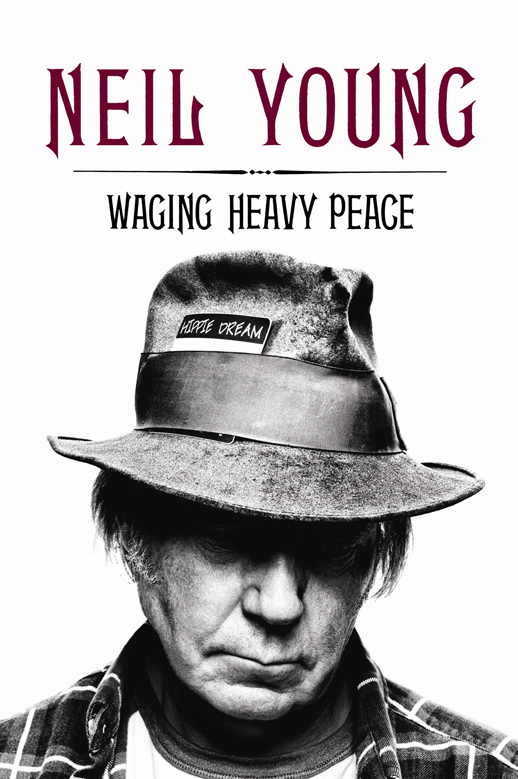by Andy Childs.
WAGING HEAVY PEACE by Neil Young
(Viking 502 pages, hardback).
Of all the books written about Neil Young, Shakey by Jimmy McDonough is perhaps the most revealing, Johnny Rogan’s Neil Young : Zero To Sixty the most musically exhaustive, and Neil & Me by Scott Young and Being Young by Astrid Young the most endearing. None of them, I would venture, quite get to the soul of the man so, as a long-time and mostly unwavering Neil Young fan, the publication of a possible intimate autobiography along the lines of Dylan’s Chronicles was an event that I was relishing more than the release of his next album. And of course as a long-time Neil Young fan I obviously shouldn’t have known what to expect.
Waging Heavy Peace, whilst offering no major surprises itself, is defiantly not a standard rock star autobiography and, on balance, all the better for it. Instead of an ordered, chronological appraisal of a life and career Young has written a rambling, folksy and eminently engaging trawl through various episodes in his life and interspersed it with frequent impassioned digressions to plug his latest obsessions – PureTone (now called Pono), his digital delivery system that enhances music downloads to studio sound quality, and Lincvolt, his electric/ethanol-powered environmentally-friendly car. There’s a lot in this book about (mostly old) cars which Young is able and more than willing to chat about endlessly, model railways (another life-long infatuation), and the occasional boat. It seems Young is happiest when he’s moving along both physically and artistically.
He writes in a manner that confidently assumes most readers will be interested in absolutely anything and everything he has to say and the result is what you might expect if you’d spent a few days in the man’s company, following him around on his ranch, driving around in his cars, listening to him reminisce at random and with nothing more strenuous in mind than an unpretentious stroll down memory lane – a privilege I suspect most Neil Young fans would trade in their copy of Trans for. The language does become a tad banal on the odd occasion when he runs out of interesting things to say and some of it reads like a cross between a diary entry and a fairly profound ‘to do’ list to himself. There is also an unfathomable but mercifully brief digression on religion and several more promising passages about his music that I wished he’d developed further. But in spite of the apparent aimlessness of his narrative he is at pains to ensure that we do not somehow misunderstand his motives – “do not doubt me in my sincerity, for it is that which has brought us to each other now”. And of course it’s his integrity that has been a vital component of his astounding artistic longevity.
The various circumstances that instigated the writing of the book are both mundane and serious; for a while Young was partly immobilised with a broken toe and found he had time on his hands, and on doctor’s advice, he has given up weed. Alcohol-free as well, he hadn’t written a song for close to a year (I’m assuming the imminent Psychedelic Pill album was written after this book) but had become more focused and seemingly more able to put the past in some kind of perspective. And in that respect the book seems to be a kind of reckoning, an attempt to reconcile the adverse effect that total devotion to his music has had on the people closest to him and a statement of his gratitude to the people who have helped him along the way (when reminiscing about these relationships he invariably ends up by thanking the person in question – he even thanks Steve Jobs!). And his eulogies to producer David Briggs, Ben Keith and Larry Johnson are particularly heartfelt. There are also several indications that a crossroads in his life has been reached. He talks about wanting “to live in a more caring and conscious way”, to become a better person, and the book ends abruptly (as have many Young projects over the years) in a kind of dream sequence before which he tantalisingly hints at some kind of family crisis meeting. Mysterious. Curiously though, there isn’t a huge amount in the book that had me reaching for his music (although I’ve never needed an excuse to do that) one exception being several inspired pages in which he describes how he recorded and constructed the transcendent song Will To Love. More of that sort of illuminating prose and a bit less about cars would have been my preference. Maybe we’ll know more in a future volume of random memoirs. Or then again maybe not. I wouldn’t be surprised either way.
Previous bulletins from Andy can be found here and the Music Book Reader lives here.
More music book news and reviews can be found on Andy’s blog here.
